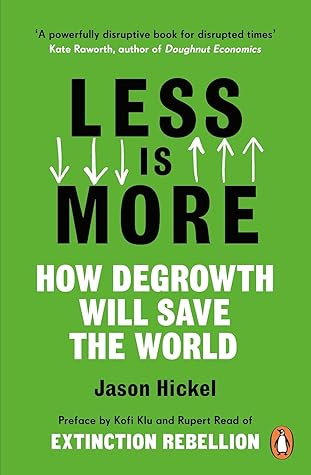More on this book
Community
Kindle Notes & Highlights
Growthism, as we might call it, stands as one of the most hegemonic ideologies in modern history. Nobody stops to question it.
The cognitive dissonance is striking.
Fredric Jameson once famously said that it is easier to imagine the end of the world than to imagine the end of capitalism.
Scientists have made it clear that the only feasible way to reverse ecological breakdown and keep global warming under 1.5°C, or even 2°C, is for high-income countries to actively slow down the mad pace of extraction, production and waste.
It’s not just our economics that needs to change. We need to change the way we see the world, and our place within it.
We took less, but we gained so much more.
Animism had endowed things with souls; industrialism makes souls into things.
take more – from nature and from labour – than you give back.
And because the rise of capitalism is cast as an expression of innate human nature – human selfishness and greed – problems like inequality and ecological breakdown seem inevitable and virtually impossible to change. But, remarkably for a story that has become so entrenched in our culture, none of this is true. Capitalism didn’t just ‘emerge’. There was no smooth, natural ‘transition’ to capitalism, and it has nothing to do with human nature.
As feudalism fell apart, free peasants began to build a clear alternative: an egalitarian, co-operative society rooted in the principles of local self-sufficiency.
This process was known as ‘enclosure’.12 Thousands of rural communities were destroyed during the enclosure movement; crops were ripped up and burned, whole villages razed to the ground. Commoners lost their access to land, forests, game, fodder, water, fish – all the resources necessary for life. And the Reformation added further fuel to the bonfire of dispossession: as Catholic monasteries were dismantled across Europe, their lands were snapped up by nobles and cleared of the people who lived there.
Adam Smith called this ‘previous accumulation’, and claimed that it came about because a few people worked really hard and saved their earnings – an idyllic tale that still gets repeated in economics textbooks. But historians see it as naïve. This was no innocent process of saving. It was a process of plunder. Karl Marx insisted on calling it ‘primitive accumulation’, to highlight the barbaric nature of the violence it entailed.
Capitalism rose on the back of organised violence, mass impoverishment, and the systematic destruction of self-sufficient subsistence economies.
Today, British politicians often seek to defend colonialism by claiming that Britain helped ‘develop’ India. But in fact exactly the opposite is true: Britain used India to develop itself.
Under capitalism, growth always requires new frontiers from which to extract uncompensated value.
Colonisers solved this problem by using asymmetric trade rules to destroy local industries across the South, forcing the colonies to serve not only as a source of raw materials but also as a captive market for Europe’s mass-produced goods.
This put peasants in direct competition with one another, with their own kin and neighbours, transforming what had been a system of collective co-operation into one organised around desperate antagonism.
Improvement became the alibi for appropriation.


